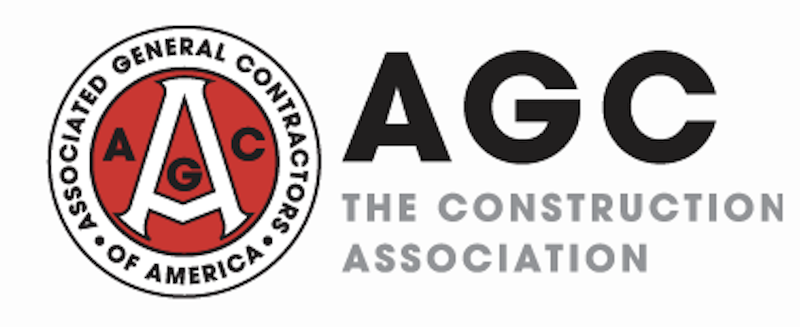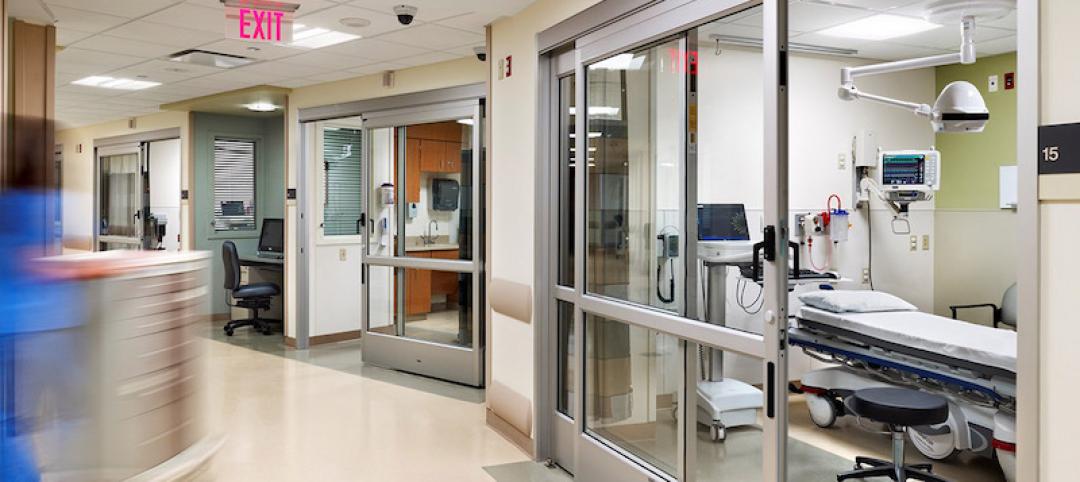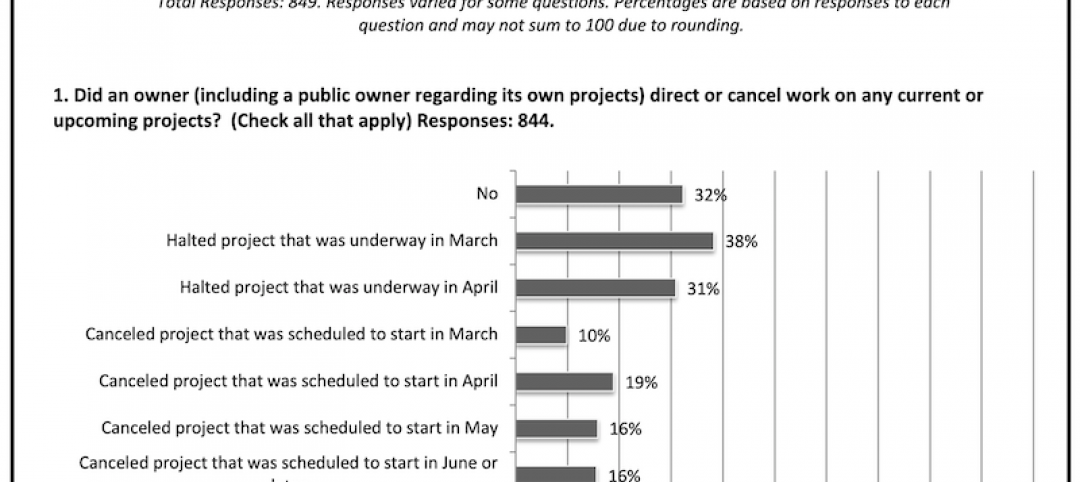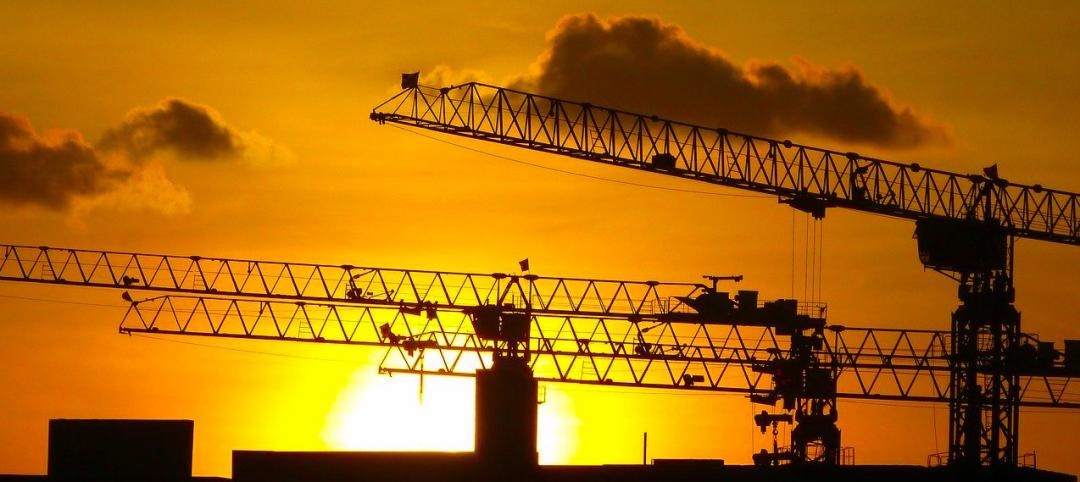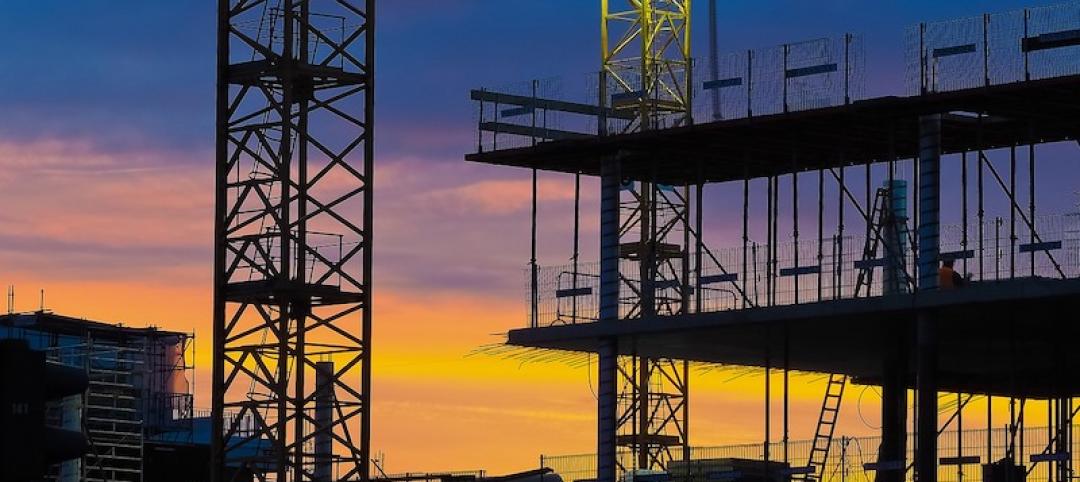The Associated General Contractors of America (AGC), with 26,000 members, has put together an eight-part webinar series whose episodes will take deeper dives into various topics related to business continuation during the COVID-19 outbreak.
The series, which runs from March 23 through April 1, each day will present a 60- to 90-minute segment on which experts will address, within the context of the virus’s spread:
• State and federal governments’ obligations to provide paid and/or unpaid leave to employees
• What labor laws are likely to require of contractors
• Contractual and related legal protections and risks for construction companies
• How to protect people and projects
• Components of comprehensive project continuity plans (e.g., if employees need to be quarantined)
• Insurance coverage
• How the outbreak is pressuring information technology
• What contractors need to watch for going forward.
Click here to get more details and to register for the webinars, which are free for AGC members and $599 for the bundle for nonmembers.
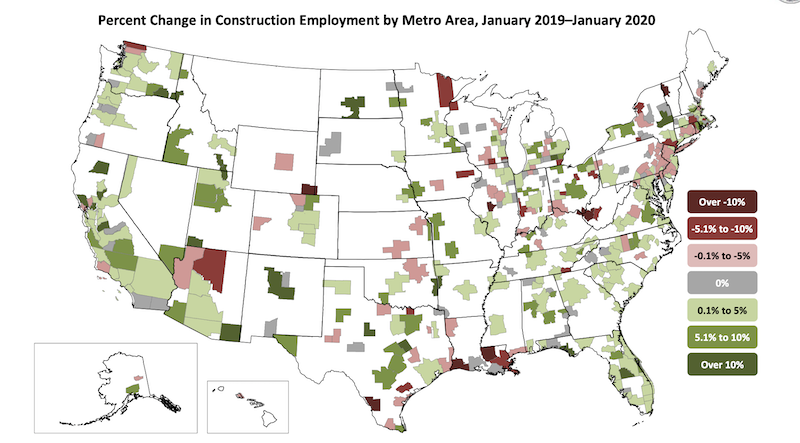
What a difference a few weeks makes. In January, AGC reported that 200 of 356 metro areas added construction jobs (see map above). A survey of contractors last week, however, found that 28% of 909 respondents had been forced to delay or halt work by an owner or government official.
“We are treating the virus with the same type of triage as medical professionals” attend to life-threatening injuries or illnesses, said Steve Sandherr, AGC’s chief executive, during a webinar last Friday where he and other association officials discussed some their group’s lobbying efforts around four objectives: to keep its members working, to keep governments “from hurting you,” says Sandherr, to educate Congress about the “essential” nature of construction, and to provide information that keeps contractors and their employees safe and mitigates losses.
Ken Simonsen, AGC’s chief economist, said that while the construction industry has been able to keep most projects active, he expects more supply-chain “glitches” and government shutdowns of jobsites. If those predictions come true, Simonsen cautions that the construction sector “is likely to have a slower recovery.”
The association also contends that the nation would be hampered in its ability to remobilize the construction industry in response to rebuilding emergencies were that industry’s activities curtailed or shut down now.
That webinar devoted a lot of time to the paid-leave mandate under the Families First Coronavirus Response Act, which was signed into law March 18, and applies to private-sector companies with 500 or fewer employees. Over a three-day period last week, AGC members flooded Congress with more than 22,000 messages about this bill (which AGC opposed) as well as about protecting construction jobs.
The main goal of AGC’s lobbying efforts is maintaining its members’ cash flow, said Jimmy Christianson, AGC’s vice president of government relations. He said AGC still has questions about the paid leave legislation (especially how the benefits will be paid for). So far, said Christianson, the association has negotiated some improvements to the bill, such as convincing Labor Secretary Eugene Scalia to exempt companies with under 50 employees from providing benefits for both paid sick leave and paid family and medical leave; and narrowing the instances of employees to be eligible to use paid family and medical leave.
Kevin Cannon, AGC’s senior director of safety and health services, told the webinar’s listeners that AGC had a hand in new OSHA guidance for recording workplace exposures to COVID 19 and preparing the workplace to thwart the virus. AGC has also created a COVID 19 Response page on its website.
Simonsen suggested that there could be opportunities arising from the pandemic, such as increased demand for labs, testing facilities, and hospitals. He speculated about hospitality buildings being repurposed for housing and medical uses. On the other hand, the pandemic will inevitably raise questions about the wisdom of investing in sports arenas, which are now dormant; and in office space if companies get more comfortable letting their employees work from home.
Michael Kennedy, AGC’s general counsel, said that the association was preparing a joint statement with the Building Trades union that would advocate for identifying construction as an essential business and service. That statement, he said, would emphasize that construction workers are already wearing protective clothing and gear, and can be instructed on exercising social distancing. “We need to make the case that we are taking care of our people,” Kennedy said.
Related Stories
Coronavirus | Mar 26, 2020
It’s not if, but when: Designing healthcare spaces that support pandemic response
What can we learn from Singapore’s response to COVID-19? How does it impact the next generation of hospitals?
Coronavirus | Mar 26, 2020
AIA praises Congress for advancing desperately needed COVID-19 relief
Approval for the latest relief legislation advances a number of AIA-supported measures to help meet the needs of firms and members.
Coronavirus | Mar 25, 2020
Coronavirus pandemic's impact on U.S. construction, notably the multifamily sector - 04-30-20 update
Coronavirus pandemic's impact on U.S. construction, notably the multifamily sector - 04-30-20 update
Coronavirus | Mar 25, 2020
Plaza Construction and Central Consulting & Contracting strategic alliance expands to Florida in response to coronavirus pandemic
New York City-based partnership to aid Florida healthcare systems amid COVID-19 outbreak and will continue medical construction in the region following resolution.
| Mar 25, 2020
Designing public health laboratories to safeguard researchers during pandemics
As laboratory designers, we want to shed light on a subset of our population critical to protecting us from, and preventing the spread of, severe outbreaks: public health researchers.
Market Data | Mar 23, 2020
Coronavirus will reshape UAE construction
The impact of the virus has been felt in the UAE, where precautionary measures have been implemented to combat the spread of the virus through social distancing.
Coronavirus | Mar 21, 2020
Perkins and Will’s CEO sees a light at the end of COVID-19 tunnel
Phil Harrison says the virus outbreak could make more clients see the connection between design and wellbeing.
Coronavirus | Mar 21, 2020
Construction business and union leaders call on government officials to include construction as an 'essential service' during shutdowns
The chief executive officer of the Associated General Contractors of America, Stephen E. Sandherr, and the President of North America’s Building Trades Unions, Sean McGarvey, issued the following joint statement urging Government Officials to Exempt Construction Work from Regional, State and Local Work Shutdowns.
Coronavirus | Mar 20, 2020
BD+C research: The AEC industry braces for tough sledding in the coming months amid COVID-19 outbreak
A new BD+C poll of U.S. architecture, engineering, and construction firms finds that companies are anticipating project postponements and delays.
Coronavirus | Mar 20, 2020
Pandemic has halted or delayed projects for 28% of contractors
Coronavirus-caused slowdown contrasts with January figures showing a majority of metro areas added construction jobs; Officials note New infrastructure funding and paid family leave fixes are needed.


